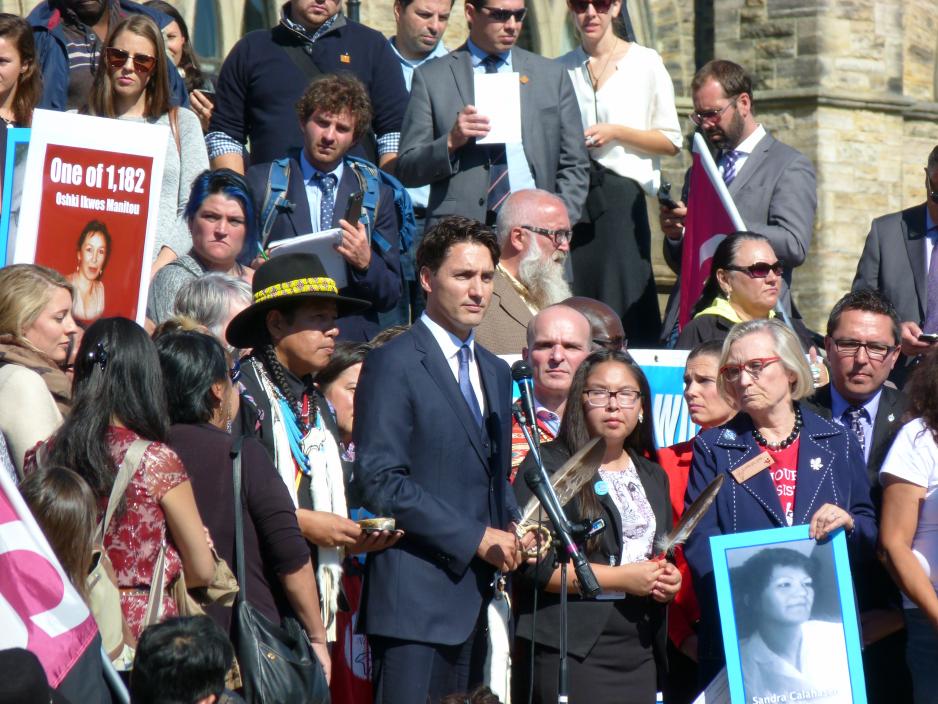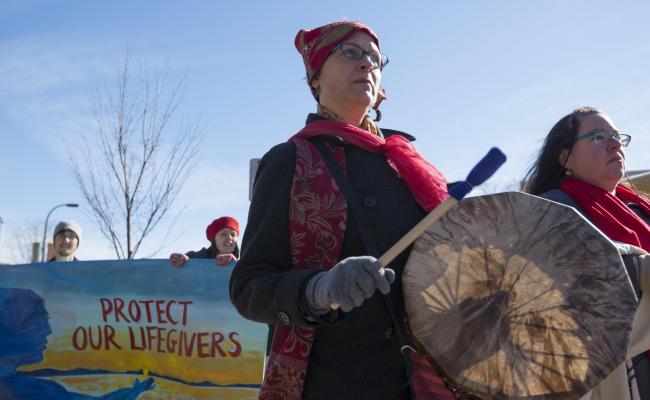Missing and Murdered Indigenous Women and Girls Report Released

Prime Minister Trudeau speaks to a crowd in front of Parliament regarding the Missing and Murdered Indigenous Women and Girls in 2016. Photo by: Delusion23
Politicians, including Prime Minister Trudeau, have struggled with using the term genocide, after the report on missing and murdered indigenous women and girls was leaked earlier this month. But on Twitter the hashtag #itsgenocide is trending.
Early this month Canada released their final report from the National Inquiry into Murdered and Missing Indigenous Women and Girls (MMIWG). Reclaiming Power and Place: The Final Report of the National Inquiry into Missing and Murdered Indigenous Women and Girls is the final piece in a multi-year pan-Canadian inquiry, and within it are 231 Calls for Justice. The Calls for Justice fall under a wide array of themes including: policing, judicial, medical, and educational.
Some of the specific recommendations include: a guaranteed livable income; safe and affordable transit and transportation services and infrastructure; enact missing persons legislation; recruit and retain more Indigenous justices of the peace; and, fully investigate deaths of Indigenous youth in care.
Also read
One of the points that Canadians have seen focused on both in the news and twitter is that the Commission officially called what has happened genocide. There has been backlash on this, with some media and politicians decrying the use of the term. Yet, Indigenous voices across the country have called for the recognition of what has happened.
What Does the Report Say?
The report says that, “The truths shared in these National Inquiry hearings tell the story – or, more accurately, thousands of stories – of acts of genocide against Indigenous women, girls, and 2SLGBTQQIA [two-spirit, lesbian, gay, bisexual, transgender, queer, questioning, intersex and asexual] people.”
The report further goes to say that, “This genocide has been empowered by colonial structures, evidenced notably by the Indian Act, the Sixties Scoop, residential schools and breaches of human and Indigenous rights, leading directly to the current increased rates of violence, death, and suicide in Indigenous populations”
The National Inquiry also released a supplementary report called, “A Legal Analysis of Genocide” which looks to provide a legal analysis of why what has happened is indeed genocide. The report outlines the legal definition of genocide based on the Genocide Convention as,
“ any of the following acts committed with intent to destroy, in whole or in part, a national, ethnical, racial or religious group, as such:
(a) Killing members of the group;
(b) Causing serious bodily or mental harm to members of the group;
(c) Deliberately inflicting on the group conditions of life calculated to bring about its physical destruction in whole or in part;
(d) Imposing measures intended to prevent births within the group;
(e) Forcibly transferring children of the group to another group.”
The supplementary report then goes on to say, “The intent to destroy Indigenous peoples in Canada was implemented gradually and intermittently, using varied tactics against distinct Indigenous communities. These acts and omissions affected their rights to life and security, but also numerous economic, cultural and social rights. In addition to the lethal conduct, the non-lethal tactics used were no less destructive and fall within the scope of the crime of genocide.”
The Responses
Although the full report is comprehensive, more than 1,200 pages, many Canadians have focused on the specific act of naming it genocide. And as Courtney Sky, a research fellow at Yellowhead Institute, a First Nations-led policy think tank wrote in the Washington Post, “The report affirms what Indigenous people have long understood — that the violence they experience is a product of settler colonialism.”
Politicians have struggled with using the term genocide, including Prime Minister Trudeau, who inicially did not use the word, but then accepted the term. However, the head of the Conservative Party, currently the opposition party in the federal government, Andrew Scheer, continues to refuse using the term genocide.
As Sheryl Lightfoot, Canada Research Chair of Global Indigenous Rights and Politics and associate professor of political science at the University of British Columbia, comments in her recent Op-Ed in the Tyee, the outcomes of this report are historical. The, “report was only the second time genocide has been concluded in an official report in a settler state, and this is the first time a sitting prime minister has acknowledged genocide within their own country.”
Tanya Talaga, wrote in an opinion piece in the Toronto Star, entitled Why Can’t We Use the Word Genocide? “The inescapable conclusion of all their harrowing and beautiful testimony is that “genocide” is the only word for the state-enabled deaths of thousands of sisters, aunties, grandmothers, cousins and friends.”
Trending on Twitter
Indigenous voices on Twitter were also clear about the terminology that should be used:
Canada. Where people are more upset about the use of the word “genocide” than the actual treatment of Indigenous people, states @BannockHammock.
While @bearclannation tweets: Most commentary in media to come out since the release of #MMIWG report is beyond disturbing- it’s violent, racist & hateful. It confirms why we have a problem of Genocide denial in this country. Its exhausting to have to go through every time a report/ inquiry is released.
Hashtag
There is even a hashtag on twitter which is called #itisgenodice. This hashtags outlines why the report is using such terminology.
An editorial in the Yukon News continues the argument, “To shy away from the word genocide because it makes us uncomfortable is to undervalue and undermine the work that the commission has done and the courage that it took for so many Indigenous people to speak their truth. The national press has been adding to the pain by almost immediately tripping over themselves to try and discredit the inquiry’s decision to use that word.”
What’s Next?
Kluane Adamek, the Yukon regional chief of the Assembly of First Nations said, “we call on Canadians to stop, to reflect, and to take a very serious look at the systemic failures and lack of leadership demonstrated that has led to the preventable murders and abductions of our women and girls.”
In her opinion piece in the Tyee, Ms. Lightfoot comments that, “It is now time to focus on actions. We have 94 Calls to Action from the TRC to work on and now 231 more Calls to Justice coming from the inquiry.”
The government of Canada recently announced $13 million for over 100 commemoration initiatives to help honour the lives and legacies of missing and murdered Indigenous women and girls, including LGTBQ and Two Spirit people. Maryam Monsef, Minister of International Development and Minister for Women and Gender Equality said, “Our government is listening to survivors and families who have told us that in order to move forward meaningfully, we must also pause to remember and honour those who are missing and whose lives have been lost. That is what we are doing by supporting these commemorative projects across Canada – ensuring that we will never forget our sisters in spirit and that we can prevent such tragedies in the future.”
Leaders of the NWT’s Indigenous women’s movement says media has a role to play in changing the attitudes which contribute to the genocide against Indigenous women and girls
Media also has a role to play, MyYellowknifeNow reported that, “Leaders of the NWT’s Indigenous women’s movement says media has a role to play in changing the attitudes which contribute to the genocide against Indigenous women and girls.” This can be done by reporting stories that are positive. The interim president of the Native Women’s Association of the NWT Jane Weyallon said in the article, “Do a better job at reporting the good stories. Because there’s a lot of good happening in the communities, it’s just that it doesn’t get reported. Instead when something bad happens, OK, we see you guys. And that’s what we should be avoiding.”
Within the Calls for Justice, there is also a list for all Canadians on things they can do including: denounce and speak out against violence against Indigenous women, girls, and 2SLGBTQQIA people; decolonize by learning the true history of Canada and Indigenous history in your local area; and, confront and speak out against racism, sexism, ignorance, homophobia, and transphobia, and teach or encourage others to do the same, wherever it occurs: in your home, in your workplace, or in social settings.

